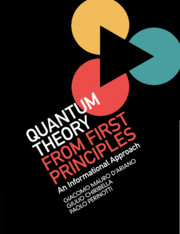Book contents
- Frontmatter
- Dedication
- Contents
- Preface
- Acknowledgments
- 1 Introduction
- Part I The Status Quo
- Part II The Informational Approach
- 3 The Framework
- 4 The New Principles
- 5 Causal Theories
- 6 Theories with Local Discriminability
- 7 The Purification Principle
- Part III Quantum InformationWithout Hilbert Spaces
- Part IV Quantum Theory from the Principles
- References
- Index
7 - The Purification Principle
from Part II - The Informational Approach
Published online by Cambridge University Press: 09 February 2017
- Frontmatter
- Dedication
- Contents
- Preface
- Acknowledgments
- 1 Introduction
- Part I The Status Quo
- Part II The Informational Approach
- 3 The Framework
- 4 The New Principles
- 5 Causal Theories
- 6 Theories with Local Discriminability
- 7 The Purification Principle
- Part III Quantum InformationWithout Hilbert Spaces
- Part IV Quantum Theory from the Principles
- References
- Index
Summary
What makes quantum theory so special? Everyone has an opinion on that: one can point at entanglement, non-locality, complementarity, uncertainty, and many other features. In a trivial sense, every answer is legitimate: every feature in which quantum theory differs from other familiar theories can be taken as the distinctive feature, because it allows you to tell quantum theory apart from what you already know. But this would not take you very far. The real question is not how to distinguish quantum theory from theories that you already know, but how to distinguish it from all theories that you could possibly imagine. Most features are not good at that – for example, physicists have invented many toy theories that exhibit entanglement, non-locality, and complementarity and still are not quantum theory. In this chapter we put forward our answer to the question of what makes quantum theory special: purification. In the following, we will explore some of the most fundamental facts about quantum theory, like entanglement and teleportation, connecting purification with a deep stream of thought that goes back to Schrödinger and von Neumann. The results presented in this chapter are also a first example of how one can reason on quantum theory starting from first principles.
A Distinctive and Fundamental Trait
The purification principle stipulates that, whenever you are ignorant about the state of a system A, you can always claim that your ignorance comes from the fact that A is a part of a larger system AB, of which you have full knowledge. When you do this, the pure state that you have to assign to the composite system AB is determined by the state of A in an essentially unique way.
The purification of mixed states is a peculiar feature – surely, not one that we experience in our everyday life. How can you claim that you know A and B if you do not know A alone? This counterintuitive feature had been noted already in the early days of quantum theory, when Erwin Schrödinger famously wrote: “Another way of expressing the peculiar situation is: the best possible knowledge of a whole does not necessarily include the best possible knowledge of all its parts.” And, in the same paper: “I would not call that one but rather the characteristic trait of quantum mechanics, the one that enforces its entire departure from classical lines of thought.”
- Type
- Chapter
- Information
- Quantum Theory from First PrinciplesAn Informational Approach, pp. 168 - 190Publisher: Cambridge University PressPrint publication year: 2017



